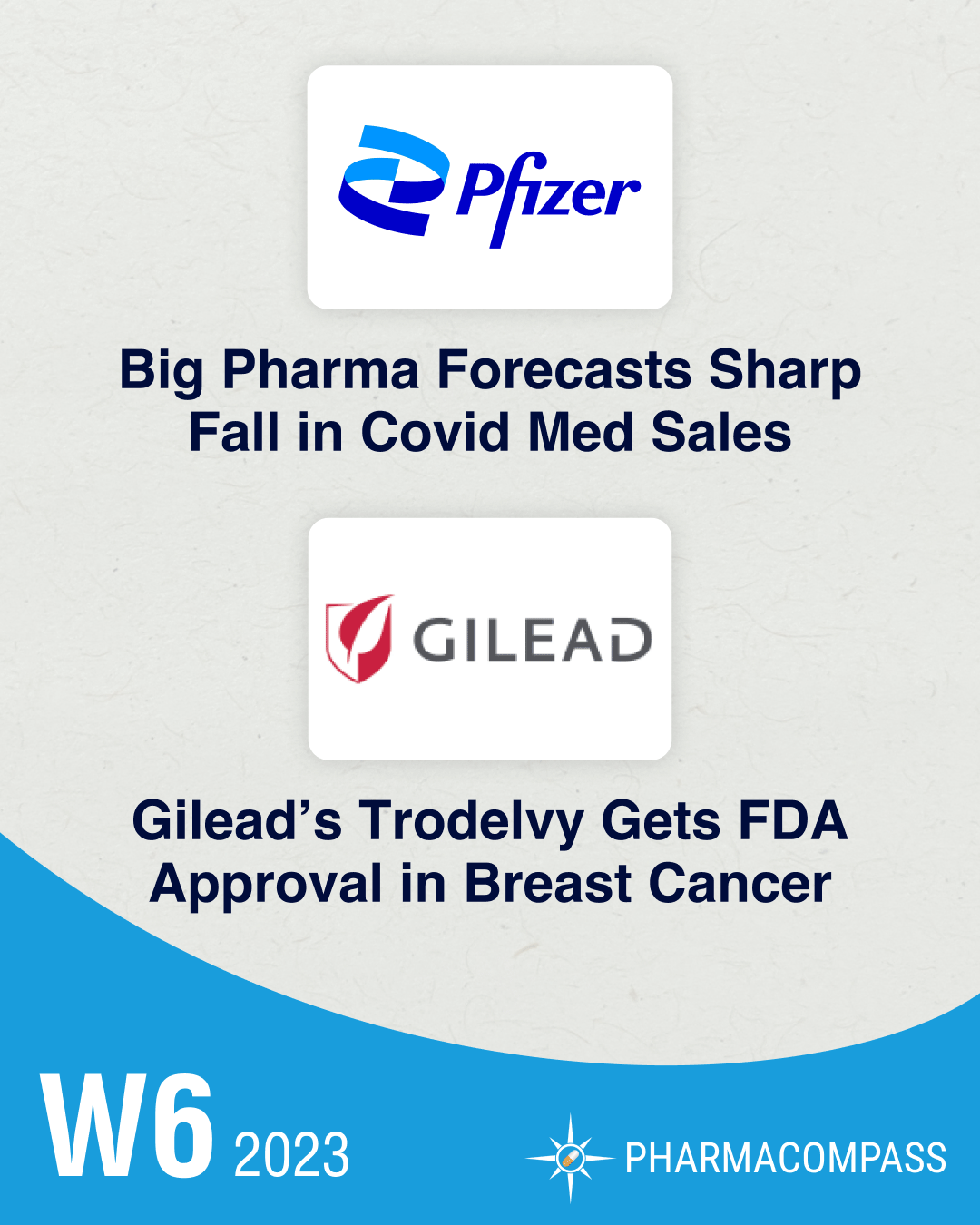
By PharmaCompass
2023-02-09
Impressions: 1,335 (Article) || 1 (Video)
As 2022 results pour in and the pandemic recedes, drugmakers who made steep profits through the sale of Covid-19 products over the last two years have forecast a sharp decline in sales of their vaccines, therapies and kits this year.
The US Food and Drug Administration (FDA) has okayed Gilead’s Trodelvy as a treatment for breast cancer. This is the third approval for Trodelvy. AstraZeneca’s diabetes drug Forxiga has received an expanded authorization in Europe as a treatment for patients suffering from heart failure.
Johnson & Johnson’s drug candidate nipocalimab, acquired through its US$ 6.5 billion acquisition of Momenta in 2020, has shown success in a mid-stage trial in treating a rare blood disorder. In separate late-stage trials, Merck’s cancer drug Keytruda and Roche’s paroxysmal nocturnal hemoglobinuria (PNH) drug crovalimab have proven to be effective.
CVS Health, one of the largest pharmacy chains in the US, is acquiring primary care company Oak Street Health for US$ 10.6 billion. A Bloomberg News report has said medical equipment maker Danaher is interested in acquiring contract drugmaker Catalent.
In regulatory news, generic drugmaker Natco Pharma’s formulation facility in Ramky SEZ near Visakhapatnam (India) has received two observations from FDA. And Bayer has appointed the former head of Roche’s drug division as its new CEO.
As pandemic recedes, drugmakers forecast sharp fall in Covid product sales
Several drugmakers who made a fortune by selling Covid-19 products over the past two years now expect sales to decline sharply. Pfizer reported US$ 56 billion in 2022 from the sale of vaccine Comirnaty and antiviral drug Paxlovid. But in 2023, it expects revenues from these two products to fall to about US$ 21.5 billion.
Similarly, Merck expects sales of its Covid-19 pill molnupiravir to plummet from US$ 5.7 billion in 2022 to about US$ 1 billion in 2023. Eli Lilly, which made US$ 2 billion in 2022 from selling its monoclonal antibody treatment, expects no revenue from the product in 2023.
Sales of Gilead’s Covid-19 treatment Veklury fell 30 percent to US$ 3.9 billion in 2022. The drugmaker expects Veklury sales to fall further to around US$ 2 billion in 2023. And Roche has warned that its profits will fall in 2023 due to a drop in demand for its Covid-19 therapies and diagnostic kits, and reduce its sales by over US$ 5 billion.
Moderna also expects a sharp drop in 2023 revenue. While its messenger RNA vaccine generated around US$ 18.4 billion in 2022, analysts expect its sales to drop to around US$ 7 billion in 2023.
FDA okays Gilead’s Trodelvy in breast cancer; Astra drug bags EU nod for heart failure
FDA has approved Gilead Sciences’ drug Trodelvy as a treatment for HR-positive/HER2-negative breast cancer patients who have stopped responding to hormone therapy and at least two previous treatments. This is the third indication for the drug that Gilead had acquired as part of its US$ 21 billion buyout of Immunomedics in 2020. Trodelvy will compete with AstraZeneca-Daiichi Sankyo’s Enhertu.
AstraZeneca’s diabetes drug Forxiga (dapagliflozin) has received an expanded authorization in Europe as a treatment for patients suffering from heart failure with any type of left ventricular ejection fraction, including mildly reduced and preserved. Ejection fraction is a measure of the amount of blood that leaves the left ventricle of the heart during each heartbeat. FDA is currently reviewing Astra’s application for the drug’s use in the same indication.
FDA has also approved Takeda’s Takhzyro as a treatment to prevent attacks of hereditary angioedema (a disorder characterized by recurrent episodes of severe swelling) in children between two and 12 years of age. And Takeda’s dengue vaccine, Qdenga, has received an authorization in the UK for those aged four years and older.
J&J drug from US$ 6.5 bn Momenta buyout shows trial gains in rare disorder
An experimental drug that Johnson & Johnson had acquired as part of its US$ 6.5 billion buyout of autoimmune disease specialist Momenta in 2020 has shown success in a phase 2 trial in treating pregnant women who are at high risk of developing an ultra-rare condition known as severe hemolytic disease of the fetus and newborn (HDFN). The drug – nipocalimab – helped 14 study participants achieve a live birth either at or after the gestational age of 32 weeks without a transfusion.
HDFN is a condition where red blood cells are attacked by antibodies from the pregnant woman, resulting in anemia in the fetus. It has no approved treatments.
In a late-stage trial, Merck’s blockbuster drug Keytruda was successful as a first-line therapy for endometrial cancer. And Roche’s experimental drug for paroxysmal nocturnal hemoglobinuria (PNH), crovalimab, has proved effective in a phase 3 trial.
CVS enters primary care through US$ 10.6 billion Oak Street Health buyout
CVS Health, one of the largest pharmacy chains in the US, is acquiring primary care company Oak Street Health for US$ 10.6 billion, including debt. In an all-cash deal, CVS valued Oak Street Health at US$ 39 per share.
The transaction is the largest since CVS acquired health insurer Aetna for US$ 70 billion in 2017. It will add clinics to the drugstore’s strategy of becoming a one-stop shop for medical care. Chicago-based Oak Street Health operates a primary care network of around 169 clinics in 21 states that focus on Medicare beneficiaries. CVS plans to nearly double its business to 300 clinics by 2026.
Danaher shows interest in buying Catalent CDMO: Medical equipment maker Danaher has expressed interest in acquiring contract drugmaker Catalent, according to a report published by Bloomberg News. The report states that Danaher’s approach values Catalent at a premium, but is unclear if Catalent is receptive to the offer. CEO Alessandro Maselli said Catalent does not comment on “market rumors”. This week, Catalent inaugurated a commercial-scale plasmid DNA manufacturing facility in Belgium with over 12,000 square feet space across multiple cleanrooms.
Bayer appoints ex-Roche executive Bill Anderson as new CEO
Bayer has appointed Bill Anderson, the former head of Roche’s pharmaceutical division, as its new CEO. Anderson will take over from current CEO Werner Baumann on June 1. His appointment comes after shareholders mounted pressure in recent months to replace Baumann and find an external successor. Anderson will join Bayer as a member of the management board on April 1.
Natco Pharma’s formulation facility in India hit by two FDA observations
Generic drugmaker Natco Pharma’s formulation facility in Ramky SEZ near Visakhapatnam (India) has received two observations from the FDA. The agency inspected the facility from January 30 to February 3 and issued the observations – one on written production process control procedure and the other on investigation procedure.The PharmaCompass Newsletter – Sign Up, Stay Ahead
Feedback, help us to improve. Click here
Image Credit : Phisper Infographic by PharmaCompass license under CC BY 2.0
“ The article is based on the information available in public and which the author believes to be true. The author is not disseminating any information, which the author believes or knows, is confidential or in conflict with the privacy of any person. The views expressed or information supplied through this article is mere opinion and observation of the author. The author does not intend to defame, insult or, cause loss or damage to anyone, in any manner, through this article.”







